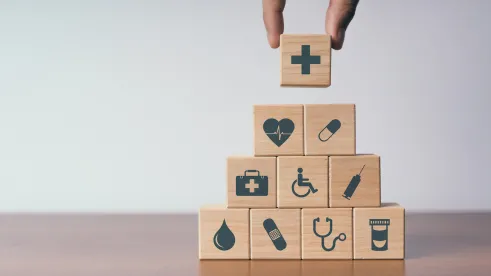As discussed in the first post in this two-part series, new players from outside the traditional healthcare paradigm are joining forces with hospitals, health systems and other providers to drive unprecedented innovation. These unexpected partnerships are bringing new solutions to market and changing how business is done and care is delivered.
Many of these collaborations revolve around data and data sharing arrangements. Traditional health industry stakeholders such as hospitals and health systems (HHSs) are partnering with technology companies—both established and start-up—to develop and market digital health solutions that engage patients beyond the brick-and-mortar clinical setting. Digital health tools are making it easier for patients to receive care in a mobile setting and access their health data across various platforms and sources. These innovative partnerships thus hold out the possibility of delivering better, faster, more targeted care.
Addressing Community Concerns
At the same time, digital health collaborations can encounter challenges regarding data privacy and security, permissions and ownership. Historically, health data was housed in one place—within the health institution. But with the rise of digital health tools, health data has become ubiquitous, raising fears about how it may be used, aggregated and shared.
In reality, the risks related to health data use, especially when the data is de-identified, are often overstated. All clinical research involves the collection and study of patient data, often identifiable and often de-identified, and all of us as patients and consumers have benefited from the results of such research. Data aggregation and sharing of information to develop and deploy improved health care devices and digital solutions is no different, and is subject to the same regulatory protections. As much as possible, participants in data-driven collaborations should seek to build trust with their patients, consumers and communities. The public will benefit from an improved understanding that de-identified data actually is far removed from individual identified data, and that the venture’s use of de-identified data will ultimately and tangibly improve patient care and outcomes.
A Change of Pace for Non-Traditional Players
Cultural differences can also pose challenges in data-focused partnerships. Technology companies are used to moving fast, usually in a non-regulated environment. Healthcare data and privacy is arguably one of the most protected areas of our society today, so tech companies entering into collaborations with HHSs may be surprised and frustrated by the slower pace of digital health endeavors.
One key to overcoming this cultural difference is a collaborative mindset and a willingness to learn on the part of both parties. Healthcare institutions have an opportunity to educate their tech partners on the regulatory realities of deals in this field, and why a certain step or process might take the time that it does. Datasets that fall into the research category, for example, must meet patient consent requirements—a complexity with which most tech companies are unfamiliar.
In turn, tech companies have the opportunity to explore with their partner whether a situation is truly a necessary hurdle, or whether there is an opening to do things differently and possibly better.
One of the most exciting elements of these unconventional partnerships is the ability to bring the energy and insights of the business world to healthcare. The most successful cross-industry collaborations proactively bring both perspectives to the table. By drawing on the strengths of each partner equally, digital health partnerships are poised to create better results for consumers, patients and society.




 />i
/>i

